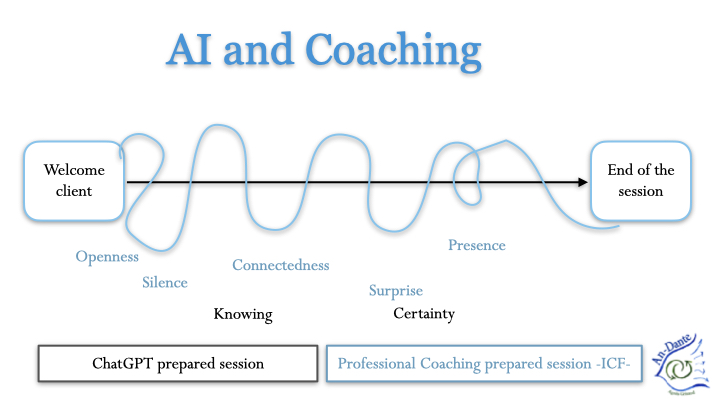How interesting to read so many papers and posts about « How to become a better coach with AI »…
These coach counsellors offer many advices, techniques and services. They know how to become a better coach. They know what the client needs before the session. They analyse with Chat GPT what has been going on in the former session and design the next session.
This is highly interesting, since it offers a clear example of what is understood as « coaching » in many minds. ie. giving advices, directing client, knowing or making assumptions on what they think, believe… and guiding them out of these wrong or ineffective paths, because they know -since chat GPT has told them- what is good and what is bad for their client.

Would you say those two postures and offers are the same ?
If not, how would you name them to discern and understand fully what is inside their value proposition ?
However Chat Gpt can be a tremendous assistant in business for professional coaches, with marketing, scheduling, invoicing, keep an eye on trends…
From the ICF professional coaching Core Competency Model, a coach :
- demonstrates ethical practice
- among them : maintains the distinctions between coaching, consulting, psychotherapy and other support professions
- Abides by the ICF Code of Ethics and upholds the Core Values
- embodies a coaching mindset
- Acknowledges that clients are responsible for their own choices
- Develops an ongoing reflective practice to enhance one’s coaching -> this is supported by Supervision
- Remains aware of and open to the influence of context and culture on self and others
- Uses awareness of self and one’s intuition to benefit clients
- Develops and maintains the ability to regulate one’s emotions
- Mentally and emotionally prepares for sessions
- establishes and maintains agreements
- Explains what coaching is and is not and describes the process to the client and relevant stakeholders
- Reaches agreement about what is and is not appropriate in the relationship, what is and is not being offered, and the responsibilities of the client and relevant stakeholders
- Partners with the client and relevant stakeholders to establish an overall coaching plan and goals
- Partners with the client to identify or reconfirm what they want to accomplish in the session
- Partners with the client to define what the client believes they need to address or resolve to achieve what they want to accomplish in the session
- Continues coaching in the direction of the client’s desired outcome unless the client indicates otherwise
- cultivates trust and safety
- Seeks to understand the client within their context which may include their identity, environment, experiences, values and beliefs
- Demonstrates respect for the client’s identity, perceptions, style and language and adapts one’s coaching to the client
- Acknowledges and respects the client’s unique talents, insights and work in the coaching process
- Acknowledges and supports the client’s expression of feelings, perceptions, concerns, beliefs and suggestions
- maintains presence
- Remains focused, observant, empathetic and responsive to the client
- Demonstrates curiosity during the coaching process
- Manages one’s emotions to stay present with the client
- Demonstrates confidence in working with strong client emotions during the coaching process
- Is comfortable working in a space of not knowing
- Creates or allows space for silence, pause or reflection
- listens actively
- evokes awareness
- facilitates client’s growth
